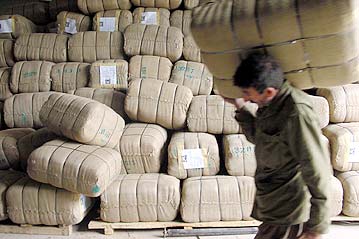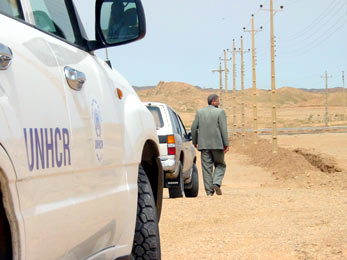Iran braces itself for new wave of refugees
Iran braces itself for new wave of refugees

KHOSRAVI, Iran, April 1 (UNHCR) - In a border region littered with the debris of past conflicts, poles to carry electricity rise above gravel fields flattened by Iranian bulldozers in preparation for the possible arrival of Iraqi refugees.
Although no Iraqi refugees have so far crossed the border, plastic water pipes have been laid in trenches and work on a system of latrines is progressing. The Iranian government, assisted by the United Nations High Commissioner for Refugees and other UN agencies, began discussing preparations months ago in case the feared flood of refugees from the war in Iraq materialises.
"Our aim is to save the lives of the people. If their lives are in danger, we will open the border," said Mohammed Ali Alizadeh, an official of Iran's Bureau for Aliens and Foreign Immigrants Affairs (BAFIA). "But we are not going to throw open the borders to encourage people to enter."
Despite already hosting what may be the world's largest refugee population, Iran has identified 10 sites along the border that could provide shelter if thousands of Iraqis do decide to flee the war engulfing their country. Preparation of facilities is well advanced at four of the sites with a capacity of 60,000 refugees, with the other six sites held in reserve. UNHCR has donated $1 million for the costs.

The agency has also spent $8 million so far on stockpiling relief items at two cities in the west of Iran - Ahwaz for the southern sector and Kermanshah for the northern half of the Iraqi border. These items were initially diverted from supplies assembled to help the Afghan refugees in Iran and other countries bordering Afghanistan.
In one of the three warehouses rented in Kermanshah, workers load tightly wrapped tents onto a conveyer belt that carries them to the top of a growing mound, part of the 36,000 tents UNHCR intends to have ready for the northern half of the border. Other workers heave bales of blankets from UNHCR trucks.
Under the UN refugee agency's contingency plan, supplies will be ready for 260,000 refugees - a total of more than 51,000 tents and 774,000 blankets, plus other necessities like mattresses, plastic sheets, lanterns and jerry cans. The same warehouses contain soap, buckets and sanitary napkins bought by UNHCR's non-governmental partners engaged in the emergency - Japan's Peace Wind, and MercyCorp.
The potential shape of a refugee problem could be as varied as the ethnic, religious and political differences inside Iraq.
Refugees could emerge across the southern extremity of the border on the Gulf, where the Shiite residents are caught in protracted fighting between Iraqi forces and encircling British troops. They could also flee the central region, where US forces are converging on Baghdad.
Or they could emerge from the north, where Kurdish factions have ruled the mountainous region of Iraq without control by the government of Saddam Hussein in Baghdad for more than a decade.
In Iran, UNHCR now has three offices near the border, at Ahwaz, Kermanshah and Orumieh in the rugged far north opposite Iraqi Kurdistan. Supplies are being assembled for up to 80,000 refugees in Khuzestan province around Ahwaz, 130,000 in the provinces of Kermanshah, Ilam and Kurdistan and a further 50,000 in West Azerbaijan province served by Orumieh.
With the co-operation of Iranian authorities, UNHCR staff from the offices have been making almost daily trips to various points along the frontier to check rumours that refugees are seeking to enter. None of the stories has so far proved true.
The precise reason that Iraqi civilians have not flooded over the border is still not clear. If they wish to leave, they could be deterred by Iraqi authorities or the fear of getting caught up in fighting by the US-led coalition forces. Alternatively, Iraqis were provided with extra rations in advance of the war and may have felt it is safer at the moment to stay sheltered in their houses than to venture toward the borders.
Understandably, Iran hopes there will be no repeat of 1991, when 1.3 million Iraqi refugees poured over the border to escape the fighting triggered when Saddam's invasion army was forced to withdraw from Kuwait and rebellions against his rule erupted in southern Iraq.
Iran, despite the legacy of a bitter eight-year war with Saddam's forces that ended in 1988, still hosts more than 200,000 Iraqis who arrived from their homeland over the past three decades.
The longest-lasting refugee population dates from 1975, when an agreement between Saddam and the Shah of Iran allowed Baghdad to tighten its grip on the rebellious Kurdish north.
The brutal 1980-88 Iran-Iraq War saw hundreds of thousands more flee across the border, mainly also from the Kurdish areas. The border area is littered with the rusting hulks of shattered tanks and armoured personnel carriers from that conflict, such that the sites selected for new refugee camps had to be cleared of land mines before other preparations could begin.
In addition, Iran is still hosting some two million Afghans who arrived after the 1979 Soviet invasion plunged Afghanistan into chaos. About 400,000 returned to Afghanistan last year, half of them under a UNHCR voluntary repatriation programme, and another 500,000 could return in 2003.
Iran has supported this refugee burden largely on its own, with relatively little international assistance. The Iranian Red Crescent Society will again take the lead if there is another Iraqi refugee influx.
UNHCR, its fellow UN agencies and a number of international non-governmental organisations that have offered to help, will perform a supporting role. When - or if - the refugees arrive, the supplies now being stockpiled near the border will be ready.








